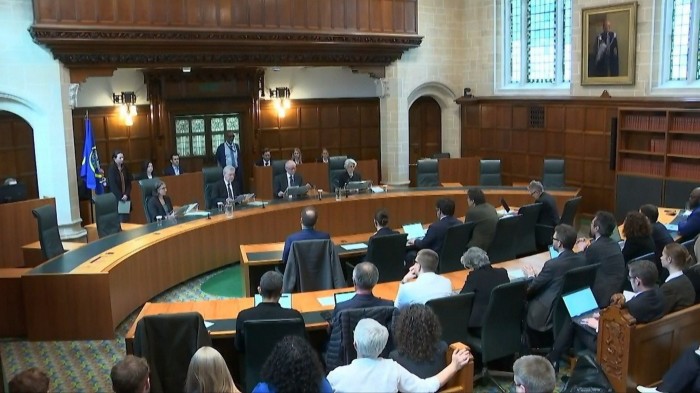Unlock the Editor’s Digest for free
Roula Khalaf, Editor of the FT, selects her favourite stories in this weekly newsletter.
The UK’s highest court has ruled that the definition of a “woman” in equality legislation refers to someone who is born biologically female, in a blow to campaigners for the rights of transgender people.
The Supreme Court found in a unanimous decision that the meaning of “woman” in anti-discrimination law did not extend to a trans woman with a gender recognition certificate.
The closely watched decision on Wednesday was welcomed by groups who campaign for the primacy of sex-based rights but prompted concerns that protections for transgender people could be undermined.
“The terms ‘woman’ and ‘sex’ in the Equality Act 2010 refer to a biological woman and biological sex,” Lord Patrick Hodge, deputy president of the Supreme Court, said.
However, he added: “We counsel against reading this judgment as a triumph of one or more groups in our society at the expense of another. It is not.”
He said the Equality Act had other protections for transgender people, including against discrimination and harassment.
The UK government said the ruling “brings clarity and confidence for women and service providers such as hospitals, refuges, and sports clubs”. It added that “single sex spaces are protected in law and will always be protected by this government”.
The ruling from the Supreme Court, which has jurisdiction across the UK, stems from a protracted legal battle in Scotland.
Campaign group For Women Scotland (FWS) challenged the Scottish government over a bill passed in 2018 intended to increase female representation on the boards of public bodies.
FWS initially succeeded in challenging the law, which included trans women in its definition of women. The Court of Session in Edinburgh ruled in 2022 that the matter was beyond the Scottish parliament’s legal authority.
However, in response to that ruling, the Scottish government changed its approach to issue revised statutory guidance, saying that the meaning of a woman under the Equality Act 2010 extended to a person with a gender certificate.
FWS challenged this guidance on the grounds that gender under the Equality Act referred to its biological meaning, and the Scottish government was overstepping its powers by in effect redefining the meaning of “woman”.
The Scottish courts rejected FWS’s challenge, but the case went to the UK Supreme Court, which ruled on the issue on Wednesday.
Chelsea Feeney, an employment associate at law firm Stevens & Bolton, said the judgment would be referred to in many disputes to come.
Employers may need to review human resources policies to ensure they accord with the updated definition of woman, she said.
Policies relating to single-sex spaces could exclude transgender people with gender recognition certificates from areas that do not align with their biological gender, she added.
“However, employers should note that the Equality Act 2010 still affords transgender people protection from discrimination through the protected characteristic of their gender reassignment,” Feeney said.
Elizabeth McGlone, managing partner at didlaw, described the implications as “huge”.
“Employers will now have to consider their ‘inclusion’ policies in respect of ‘women’s’ facilities and ensure that they understand that woman, for the purposes of the Equality Act, means ‘biological woman’,” she said.
The Scottish Greens described the verdict as “deeply concerning for human rights” and “a huge blow to some of the most marginalised people in our society”.
“It could remove important protections and will leave many trans people and their loved ones deeply anxious,” said Maggie Chapman MSP.

